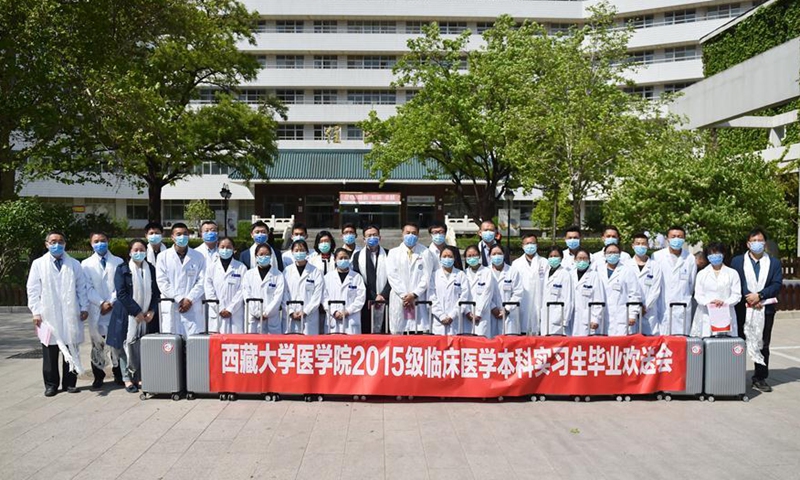China pledges to nurture 6,822 rural students free to become medical workers
By Huang Lanlan Source:Global Times Published: 2020/6/9 9:48:40

Medical students from Tibet University pose for a group photo with their tutors and other staff members at the Peking University Shougang Hospital in Beijing, capital of China, April 24, 2020. A total of 17 medical students from Tibet University finished their 48-week clinical internship at the Peking University Shougang Hospital on Friday. (Xinhua/Peng Ziyang)
China vows to recruit 6,822 more students hailing only from rural areas in 2020 to become future medical staffers, by providing free five-year university education, said national education authority.Students in this project will be enrolled in majors including clinical medicine, traditional Chinese medicine (TCM) and medicines of China's three ethnic minorities: Mongolian, Tibetan and Dai, according to a notice the Ministry of Education posted on its website on Wednesday.
Only students and their families with permanent residences (hukou) registered in rural areas for more than three consecutive years will be eligible for the benefits, read the statement.
Candidates will be selected through this year's national college entrance exam, it added.
This is not the first year for China to offer free education to rural medical students, an official with the ministry told the Global Times Thursday.
Since the launch of this project in 2010, China has trained and educated nearly 57,000 medical students from rural regions at the country's 113 universities, he noted. Students can get free tuition and accommodation, and enjoy living allowances during their study term.
Generally, the average tuition fee of medical students at China's public universities is around 5,000 yuan ($702) a year, the Global Times reporter found.
This project can largely help its impoverished participants alleviate financial burden in education. "So far, 35,000 rural families have been lifted out of poverty because of the medical student nurture project," the ministry official said.
After five years of university education, students of the project are to work at designated medical institutes, most of which are located in lesser developed areas, stated the ministry.
The project, though not a new one, caught public attention this year probably because of the novel coronavirus (COVID-19) pandemic. It became a trending topic on Weibo on Thursday afternoon with over 50 million views as of press time.
Many Chinese netizens lauded the project because it not only helps poor students to attain higher education but also improves health care in less developed areas.
"The pandemic made me realize how important doctors and nurses are," commented a Weibo user with the handle zhangziqi. "Hope we have more and more medical workers in not just first-tier cities but also small villages and towns."
Posted in: SOCIETY